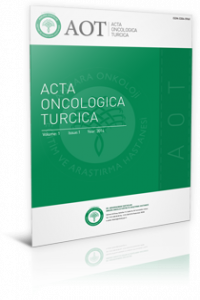Hayvan ve İnsanlarda Hepatosellüler Karsinomun Erken Teşhisinde Alfa-L Fukosidaz'ın Alfa-fetoproteine olan Üstünlüğü
Hepatoselüler karsinom, Dietilnitrozamine; Alpha-L-fucosidase; Alpha-fetoprotein; Antioksidan seviyesi; Erken tanı
Priority of Alpha-L- Fucosidase Over Alpha fetoprotein in Early Detection of Hepatocellular Carcinoma in Animals and Human
Hepatocellular carcinoma (HCC), Diethylnitrosoamine (DENA), Alpha-L-Fucosidase, Alpha-fetoprotein, Liver indices antioxidant status, Early detection,
___
- Zerbini A, Pilli M, Ferrari C, Missale G. Is there a role carcinoma? Dig Liver Dis. 2006;38:221-5. in hepatocellular
- Marrero JA, Pelletier S. Hepatocellular carcinoma. Clin Liver Dis. 2006;10:339-51.
- Takuma Y, Nouso K. Nonalcoholic steatohepatitis- associated hepatocellular carcinoma: our case series and literature review. World J Gastroenterol. 2010;16:1436-41.
- Motola-Kuba D, Zamora-Valdés D, Uribe M, Méndez-Sánchez N. Hepatocellular carcinoma. An overview. Ann Hepatol. 2006;5:16-24.
- Besaratinia A, Kim SI, Hainaut P, Pfeifer GP. In vitro recapitulating of TP53 mutagenesis in hepatocellular carcinoma associated with dietary aflatoxin 2009;137:1127-37. Gastroenterology.
- Liu Y, Wu F. Global burden of aflatoxin-induced hepatocellular carcinoma: a risk assessment. Environ Health Perspect. 2010;818:118-24.
- Bruix J, Sherman M, American Association for the Study of Liver D. Management of hepatocellular carcinoma: an update. Hepatology. 2011;53:1020- 22.
- Liu CJ, Kao JH. Hepatitis B virus-related hepatocellular carcinoma: epidemiology and Özgün Araştırma 7
- Available at www.actaoncologicaturcica.com
- Copyright © Dr. A.Y.Ankara Onkoloji Hastanesi of hepatocellular 10. Naugler WE, Schwartz JM. Hepatocellular
- carcinoma. Dis Mon. 54, 2008:432.
- Yao DF, Dong ZZ, Yao M. Specific molecular markers in hepatocellular carcinoma. Hepatobiliary Pancreat Dis Int. 2007;6:241-47.
- Thorgeirsson SS, Lee JS, Grisham JW. Functional genomics of hepatocellular carcinoma. Hepatology. 2006;43(2 Suppl 1):S145-50.
- Lachenmayer A, Alsinet C, Chang CY, Llovet JM. Molecular approaches to treatment of hepatocellular carcinoma. Dig Liver Dis. 2010;42 Suppl 3:S264- 72.
- Nakatsura T, Yoshitake Y, Senju S, et al. Glypican- 3, overexpressed specifically in human hepatocellular carcinoma, is a novel tumor marker. Biochem Biophys Res Commun. 2003;306:16-25.
- Lencioni R. Surveillance and early diagnosis of hepatocellular carcinoma. Dig Liver Dis. 2010;42 Suppl 3:S223-7.
- Fiume L, Bolondi L, Busi C, et al. Doxorubicin coupled to lactosaminated albumin inhibits the growth of hepatocellular carcinomas induced in rats by diethylnitrosamine. J Hepatol. 2005;43:645-52.
- Giardina MG, Matarazzo M, Varriale A, Morante R, Napoli A, Martino R. Serum alpha-L-fucosidase. A useful marker in the diagnosis of hepatocellular carcinoma. Cancer. 1992;70:1044-48.
- Tangkijvanich P, Tosukhowong P, Bunyongyod P, et al. Alpha-L-fucosidase as a serum marker of hepatocellular carcinoma in Thailand. Southeast Asian J Trop Med Public Health. 1999;30:110-4.
- Bukofzer S, Stass PM, Kew MC, de Beer M, Groeneveld HT. Alpha-L-fucosidase as a serum marker of hepatocellular carcinoma in southern African blacks. Br J Cancer. 1989;59:417-20.
- Swets JA. Measuring the accuracy of diagnostic systems. Science. 1988;240:1285-93.
- Haydon GH, Hayes PC. Screening for hepatocellular carcinoma. 1996;8:856-60. Hepatol.
- Ayude D, Fernández-Rodríguez J, Rodríguez- Berrocal FJ, et al. Value of the serum alpha-L- fucosidase activity in the diagnosis of colorectal cancer. Oncology 2000;59:310-6.
- Abdel-Aleem H, Ahmed A, Sabra AM, Zakhari M, Soliman M, Hamed H. Serum alpha L-fucosidase enzyme activity in ovarian and other female genital tract 1996:55:273-9. Obstet. 55, in the carcinoma. Gastroenterology.
- Zucman-Rossi J. Molecular classification of hepatocellular carcinoma. Dig Liver Dis. 2010;42 Suppl 3:S235-42.
- Trinchet JC, Chaffaut C, Bourcier V, et al. Ultrasonographic surveillance of hepatocellular carcinoma in cirrhosis: a randomized trial comparing 3- and 2011;54:1987-97. Hepatology.
- Sherman M. Hepatocellular carcinoma: screening and staging. Clin Liver Dis. 2011;15:323-34.
- Farinati F, Marino D, De Giorgio M, et al. Diagnostic and prognostic role of alpha-fetoprotein in hepatocellular carcinoma: both or neither? The American 2006;101:524-32. of Gastroenterology
- Deugnier Y, David V, Brissot P, et al. Serum alpha- L-fucosidase: a new marker for the diagnosis of primary 1984;4:889-92. Hepatology.
- el-Houseini ME, Mohammed MS, Elshemey WM, Hussein TD, Desouky OS, Elsayed AA. Enhanced detection of hepatocellular carcinoma. Cancer Control. 2005;12:248-53.
- Wang JJ, Cao EH. Rapid kinetic rate assay of the serum hepatocellular carcinoma by using a novel substrate. Clin Chim Acta. 2004;347:103-9. patients with
- Wright LM, Kreikemeier JT, Fimmel CJ. A concise review of serum markers for hepatocellular cancer. Cancer Detect Prev. 2007;31:35-44.
- Gomaa AI, Khan SA, Leen EL, Waked I, Taylor- Robinson carcinoma. World J Gastroenterol. 2009;15:1301-14. of hepatocellular
- Zhu J, Jiang F, Ni HB, et al. Combined analysis of serum gamma-glutamyl transferase isoenzyme II, alpha-L-fucosidase and alpha-fetoprotein detected using a commercial kit in the diagnosis of hepatocellular 2013;5:89-94. Exp Ther Med.
- ISSN: 0304-596X
- Başlangıç: 2015
- Yayıncı: Dr. Abdurrahman Yurtaslan Ankara Onkoloji EAH
Emrah ERASLAN, Pınar ERASLAN, Mehmet ÖZTÜRK, Ömür Berna Çakmak ÖKSÜZOĞLU
Renal Hücreli Kanser Nedeniyle Nefrektomi Yapılan Olguda 16 yıl Sonra Gelişen İzole Beyin Metastazı
Özge GÜMÜŞAY, Mustafa BENEKLİ, Efnan ALGIN, Onur ERTUNÇ, Ömer ULUOĞLU, Aydın PAŞAOĞLU, Yusuf ÖNER, Ahmet ÖZET
Glikojenden Zengin Berrak Hücreli Meme Karsinomu: Olgu Sunumu
Havva Yeşil ÇINKIR, Gülay Bilir DİLEK, Ayşe DEMİRCİ, Fatma Buğdaycı BAŞAL, Kübra AYDIN, Umut DEMİRCİ, Berna ÖKSÜZOĞLU, Necati ALKIŞ
Klinik Olarak Çok Önemli Nadir Benign Renal Tümör: Renal Onkositom Olgu Sunumu
Esref Oguz GÜVEN, İsmail SELVİ, Fatih HIZLI, Halil BAŞAR
Çocuklarda Kanser, Ölüm Kavramı ve Yas
Ayşe Demirci, Umut DEMİRCİ, Uğur COŞKUN, Hacer DEMİR, Efnan ALGIN, Fatma BAŞAL, Deniz YAMAÇ
Malign Melanomda Sentinel Lenf Nodu Biyopsisi: Güncel Yaklaşımlar
İlay Öztürk GÖZÜKARA, Suna Kabil KUCUR, Hüseyin DURUKAN, Saffet DİLEK
İleri Evre Mide Kanserli Hastalarda mTOR Durumunun Sağkalım ve Tümör Karakteristikleri ile İlişkisi
Kübra AYDIN, Osman Gökhan DEMİR
Nabil Mohie Abdel Hamid, Maiada Hasan Nazmy, Bakheet Elkot Moustafa, Sahar Mohamed Saad El-din
